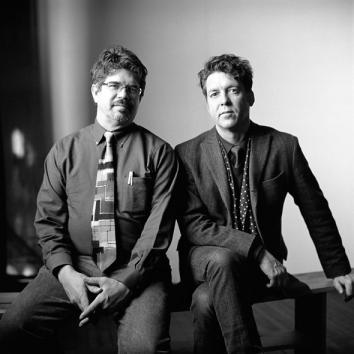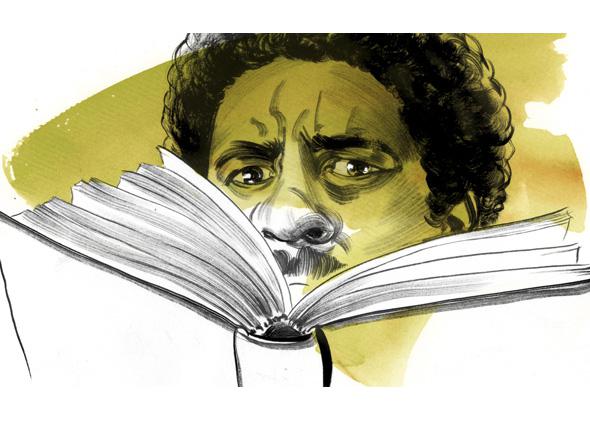“Is stand-up comedy literature?” David Henry and Joe Henry, a fraternal author team, ask this as Furious Cool: Richard Pryor and the World That Made Him enters the home stretch. Their answer cites Ezra Pound and William Carlos Williams, and follows a confident discussion about the resonance of Pryor’s Live on the Sunset Strip with Dante’s Inferno, a discussion made alongside a daring critical interpretation of Eudora Welty. Thus, their answer to that question is an excited “Yes, of course.” Or in a different mood: Their answer is, “Does a man pursued by a bear shit his pants in the woods?”
One is willing to go with them a long way in giving the work of Richard Pryor (1940–2005) a grand reading. He was a superlative American monologist and comic writer. Furious Cool maps Pryor’s cultural heritage (Jerry Lewis and the Chitlin’ Circuit, vaudeville organs and whorehouse pianos) and suggests how he transformed such influences into an unprecedented voice creating works in the genre—naturally enough for a black American—of absurdism.
The Henrys acknowledge this with the book’s epigraph, which comes courtesy of Antonin Artaud—a passionate lament about our living hell of artists “dallying with forms, instead of being like victims burnt at the stake, signaling through the flames.” The authors link Pryor to Artaud’s Theatre of Cruelty, thus encouraging a view of Pryor’s best work (which by any count includes That Nigger’s Crazy, … Is It Something I Said?, and Jo Jo Dancer, Your Life Is Calling) as surrealism attacking societal sickness.
But the Artaud quote takes on a special meaning in light of the death-defying, life-defining 1980 incident in which Pryor—during the most unpleasant of many mean and crazy drug binges—lit himself aflame. The Henrys are at once serious about reading Pryor rigorously and onto the game of riffing on his celebrity image and cultural symbolic value, and so for them that crazed self-immolation suggests not just temporary psychosis but an instance of performance art.
Which is a legitimate reading. The only way to construct narrative order from the ugly mess of Pryor’s biography (and the odd, odd shape of his unclassifiable career’s various provocations) is to understand the freebasing incident as existential protest art—as the act of a loudmouth voicing something unspeakable and of an author burning the text of his only book. This seems soft-headed, somehow—People magazine stuff, a tabloid fallacy of the Hollywood beat. But Richard Pryor’s particular pathos is that this is the view of his life in which he’s most legible.
“Richard is a junkie first, a genius second,” said Paul Mooney, Pryor’s longtime friend and writer. This is not true of, say, Miles Davis, the comedian’s patron, colleague, and drug buddy. Reading Davis’ life, you can grapple with a coherent self, despite the jazz artist’s thorough remoteness and years of junkie opacity. Pryor’s life was formless except where it was hollow. A girlfriend here describes him as a sure genius and “a very dead personality.”
Pryor’s lack of inhibition in picking at the scabs of black American history encourages a comparison to his era’s pop icons of black masculinity. He had designs on updating the snazziness of Sammy Davis Jr., but lacked the Candyland sweetness or the ability to be apolitical. He lacked the confidence and discipline to be a triumphant Ali and the smoothness to polish his raunch a la Redd Foxx. But there are traces of these archetypes in the Pryor icon, plus a lot of Stagger Lee. When we take into account, also, Pryor’s flagrant history of abusing women, it becomes clear that it’s impossible to salvage him as a hero. The readiest way to make sense of him—and to hold at arm’s length the pathology that overshadowed and overpowered and informed his genius—is to approach him as some kind of martyr. That formulation requires an embrace of rock and roll ritual sacrifice—the capital-R Romance of visionary gifts.
Thus, the Henrys’ intellectual approach to pursuing the helplessly sensational life develops a mystic quality. Of a transformative retreat amid the bohemian vibes of the Bay Area, they write, “Like Jesus to the wilderness, Robert Johnson to the crossroads, and Malcolm X to Mecca, Richard went to Berkeley.” This is how a stand-up becomes a saint.
But how does he produce literature? The Henrys’ (perhaps unnecessary) defense of their approach arrives just after they’ve recounted an academic’s analysis of Pryor’s Live on the Sunset Strip, one that treats it as a modern American analog of Dante’s Inferno. They don’t wholly embrace this notion, but they treat it with intrigued respect, despite acknowledging that there is no biographical evidence that Pryor knew the epic poem. To some readers, this analysis will give Professor Eddie Tafoya, the “self-proclaimed comediologist” who authored the concept, an aspect of Charles Kinbote, the mad annotator within Nabokov’s Pale Fire.

Photo by Michael Wilson
For the Henrys, it is a setup for a claim about monomyth and mysticism—the suggestion that stories sometimes know more than the storytellers to whom they deliver themselves. “Richard’s characters were wiser and more clear-eyed in their understanding of the world than he ever managed to be in navigating his own life,” they write. “But when he was all alone in command of a bare stage with no obstacles, he could go with them anywhere and not stumble.”
Is stand-up literature? Most of what Pryor did during his 1971 Berkeley sabbatical was to get high, by the way, though he did present avant-garde sets—jazzlike variations on animal noises and disruptive epithets—and, notably, struck up a friendship with Ishmael Reed, who in the pastiche of Mumbo Jumbo and other novels performed fractured riffs on identity congruent with Pryor’s most lucid tours of his id. Reed, who worked W.E.B. Du Bois’ theory of double consciousness and the divided self into scorching satire, is one of two signal writers whose fiction one might apply to an understanding of Pryor. The other is Percival Everett, another postmodern puzzle maker. Writing and revising the self is Everett’s subject, as it was Pryor’s. Studying any of his dizzying inquisitions into the construction of black identity will help prepare the aspiring self-declared comediologist to make sense of Pryor and his persona. For the simplest definition of this comedian—whose flamboyant rejections of propriety expanded his art and whose refusals of self-dignity narrowed his life—look no further than the title of Everett’s 2009 novel: I Am Not Sidney Poitier.
—
Furious Cool: Richard Pryor and the World That Made Him by David Henry and Joe Henry. Algonquin Books.
See all the pieces in this month’s Slate Book Review.
Sign up for the Slate Book Review monthly newsletter.
